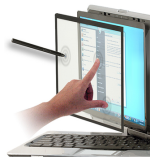Microsoft vs. Apple: the multi-touch war

Because the Evil Queen of Numbers has kept the Windows branch so quiet about Windows 7, we've been relying entirely on speculation, the blogosphere, leaks and occasionally "that dreaded New Yorker" as Sinofsky would probably say.
Multi-touch is the latest craze it seems. Once the technology was finally perfected, it went through a series of acquisitions which Apple took under its disproportionate wing; hence why we see multi-touch technology in the iPhone and iPod Touch devices. It's taken nearly three decades to see it reach our technology, but now it'll be what could well replace the standard keyboard and mouse. But are we ready for it?

Touch screens have been around for a long while, ranging from Tablet PC's, mobile devices (or "Palm Pilots" back in the day), to those beeping kiosks you have at railway stations to tell you which platform to jump from catch your train from. Having two-fingers being pressed against a screen would ordinarily confuse these simple minded devices, whereas a multi-touch device can translate a physical hardware input into a software based command - rotate, crop, move, select, expand, increase or decrease, and more...
Whilst my sister disagrees with interactive whiteboards, and makes many a point about their lack of usability, multi-touch technology relies on integrated hardware. Windows 7 has already been seen to improve usability and enhance "quality of service", if you want to call using a computer that. But considering the "iGeneration", being those of my generation going forwards as the next wave of IT users, is advanced user interaction a wholly positive thing?
"Today almost all [PC] interaction is keyboard-mouse," Microsoft chairman Bill Gates says. "Over years to come, the role of speech, vision, ink--all of those--will be huge."
We've been brought up on Windows, and for some (rather few actually), Macs. Keyboards and mice have been the only available way of communicating what you want a computer to do, then touch-screens came about. Voice technology has been an interesting development but proved that it doesn't always work as you'd want it to. Multi-touch won't replace the keyboard and mouse completely, at least for Windows users for a while, but Apple are jumping at the chance to make a device and operating system to compete as much as possible.
I and many welcome competition between companies, businesses and corporations, as it gives us more choice over what we use. Apple have been rumoured to be creating their own next-generation device, the Macbook Touch. Whilst they are still rumours, in my eyes it's certainly not an impossibility; more likely it's an inevitability with Windows 7 just around the corner. One source from MacDailyNews told Gizmodo of their knowledge on this supposed Macbook Touch:
Think MacBook screen, possibly a bit smaller, in glass with iPhone-like, but fuller-featured multi-touch. Gesture library. Full Mac OS X. This is why they bought P.A. Semi. Possibly with Immersion's haptic tech. Slot-loading SuperDrive. Accelerometer. GPS. Pretty expensive to produce initially, but sold at "low" price that will reduce margins. Apple wants to move these babies. And move they will. This is some sick shit. App Store-compatible, able to run Mac apps, too. By October at the latest.
Whether the device itself is fact or fiction, they've made a trademark patent bid available from the US Patent and Trademark Office, which throws out some interesting suggestions. The device has been designed and modelled so many times, more often than Michael Jackson's nose, with some promising and exciting prototype designs. A possible look at the future of Apple's mobile and multi-touch computing future, I present to thee.
A video created by an MBA student at Georgia State University (presumably the Georgia which hasn't been obliterated by Russia) shows the possibility of usability and function using concept designs, simulated and produced onto YouTube. Whilst again, it's clear to state this isn't what the rumoured device will do, it shows how multi-touch could be brought to Mac products.
There's a brilliant article on how the hardware technology works, and plenty of videos out there demonstrating hands-on what this fantastic technology can do. But what do you think?
[poll id=6]